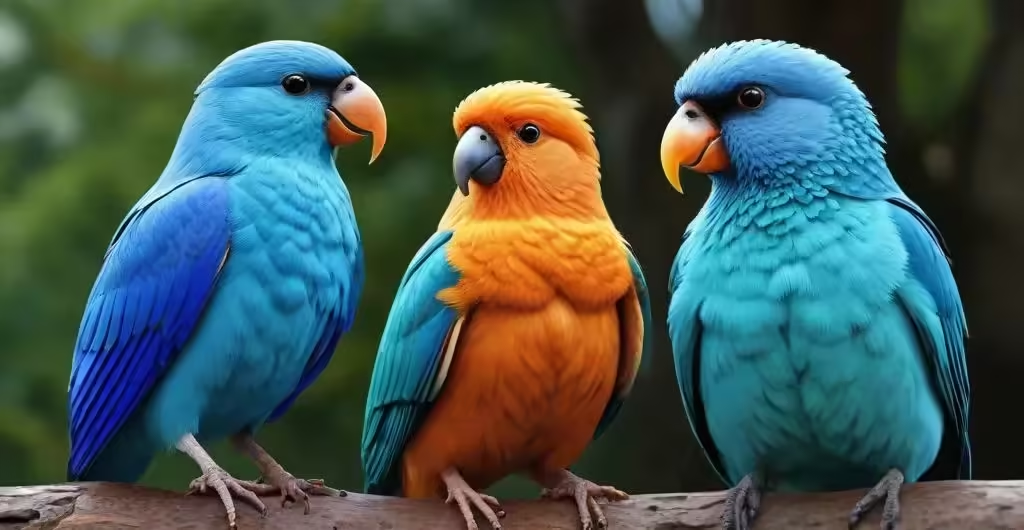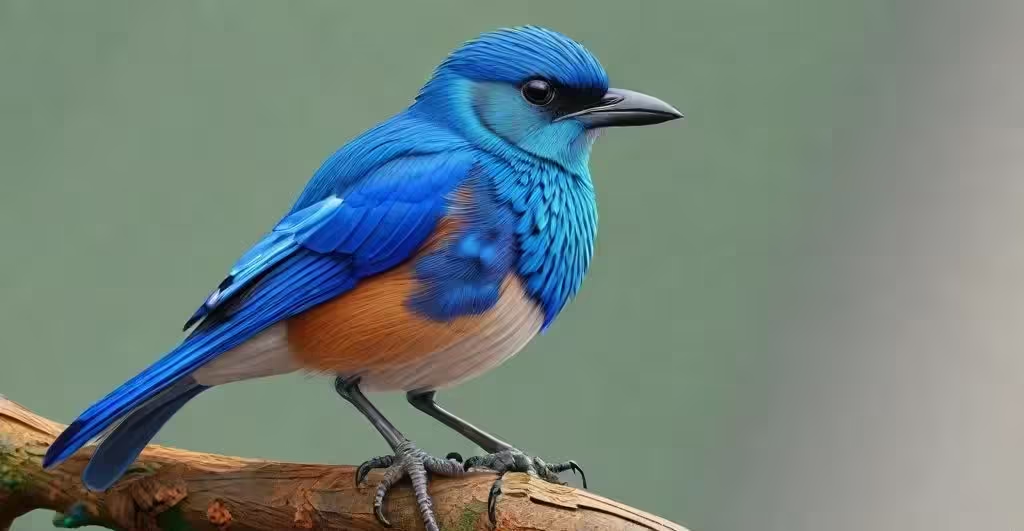Flax seeds, also known as linseeds, have become increasingly popular in human diets due to their rich nutritional profile. However, many bird owners and wildlife enthusiasts may wonder, “Can birds eat flax seed?” The simple answer is yes! Birds can eat flax seeds, and they can benefit significantly from this nutrient-dense food. However, as with any addition to a bird’s diet, there are factors to consider, such as quantity, preparation methods, and potential health benefits. In this article, we will explore the advantages and potential concerns of feeding flax seeds to birds.
Table of Contents
ToggleWhat Are Flax Seeds?
Flax seeds come from the flax plant (Linum usitatissimum), which is cultivated for both its seeds and fibers. These seeds are tiny, flat, and oval-shaped, with a slightly nutty flavor. Flax seeds are available in two varieties: brown and golden. Both types have similar nutritional benefits, offering an excellent source of fiber, protein, and essential fatty acids, especially omega-3.
Nutritional Composition of Flax Seeds
Flax seeds are a powerhouse of nutrients. Below are some key components of flax seeds that contribute to their health benefits:
- Omega-3 Fatty Acids: These are essential for heart and brain health.
- Lignans: Antioxidants that help reduce the risk of chronic diseases.
- Fiber: Helps with digestion and gut health.
- Protein: Important for growth, repair, and overall health.
- Vitamins: Including B vitamins, which help with energy metabolism.
- Minerals: Such as magnesium, phosphorus, and manganese, which are vital for bone and muscle health.
Given this impressive nutritional profile, it’s no wonder that flax seeds have found their way into bird diets as well. But how exactly do they benefit birds?
Can Birds Eat Flax Seed Safely?
Birds, both domestic and wild, can safely eat flax seeds, and many bird species actually enjoy them. Whether you’re feeding backyard birds or pet birds, incorporating flax seeds into their diet can be a healthy choice. However, it’s important to introduce them properly and in moderation.
Health Benefits of Flax Seeds for Birds
Feeding birds flax seeds can provide a range of health benefits:
1. Improved Feather Quality
Flax seeds are rich in omega-3 fatty acids, which play a crucial role in maintaining healthy skin and feathers. Birds that consume flax seeds regularly tend to have shinier, smoother feathers. This can be particularly beneficial for species like parrots, finches, and canaries, where feather condition is a good indicator of overall health.
2. Enhanced Digestive Health
The high fiber content in flax seeds can help birds maintain a healthy digestive system. Fiber aids in digestion by promoting regular bowel movements and supporting gut health. For species like parrots and cockatiels, which can sometimes suffer from digestive issues, flax seeds may provide relief.
3. Increased Energy and Vitality
Flax seeds are an excellent source of healthy fats, which provide birds with a great source of energy. These fats are especially useful for wild birds, helping them survive in colder months when food may be scarce. Domesticated birds can also benefit from the added energy, especially during breeding seasons.
4. Support for Heart Health
The omega-3 fatty acids found in flax seeds are not only good for humans, but also for birds. Omega-3s help reduce inflammation and support cardiovascular health. For birds prone to heart problems, such as parrots and cockatoos, flax seeds can be a heart-healthy addition to their diet.
5. Rich in Antioxidants
Flax seeds contain lignans, which are powerful antioxidants. These compounds help neutralize free radicals in the body, reducing the risk of chronic diseases. Birds, like humans, benefit from antioxidants as they promote overall health and longevity.
How to Serve Flax Seeds to Birds
When feeding flax seeds to birds, there are several preparation methods to consider:
1. Whole Flax Seeds
Whole flax seeds can be offered directly to birds. However, due to their small size, it’s important to ensure that birds can digest them properly. Some birds, particularly smaller species like finches and canaries, may find whole flax seeds difficult to consume. In such cases, it’s best to offer ground flax seeds.
2. Ground Flax Seeds
Grinding flax seeds makes them easier to digest, especially for smaller bird species. You can sprinkle ground flax seeds over your bird’s regular food or mix them into homemade bird treats. This method ensures that birds can fully benefit from the nutrients without the difficulty of cracking open the hard shell.
3. Soaked Flax Seeds
Soaking flax seeds in water for a few hours can soften them, making them easier for birds to eat. This method is particularly useful for older birds or those with dental issues. Once soaked, the seeds can be mixed with other bird food, such as fruits, vegetables, or grains.
How Much Flax Seed Should Birds Eat?
While flax seeds are nutritious, moderation is key. Birds, especially pet birds, should not consume flax seeds in large quantities. The high-fat content, while beneficial, can lead to obesity if overfed. A teaspoon of flax seeds per day is generally enough for medium to large-sized birds, while smaller birds should be given a smaller amount.
For wild birds, scattering flax seeds alongside other bird feed is a great way to provide variety and ensure a balanced diet. Mixing flax seeds with sunflower seeds, millet, or other birdseed mixes can offer a well-rounded nutritional profile.
Risks of Feeding Flax Seeds to Birds
While flax seeds are generally safe for birds, there are a few potential concerns to keep in mind:
1. Overfeeding
As mentioned earlier, flax seeds are high in fat. Overfeeding flax seeds to birds can lead to obesity, which can cause health problems such as heart disease, liver problems, and mobility issues. It’s important to provide flax seeds as part of a varied diet, ensuring birds receive a balance of proteins, carbohydrates, and fats.
2. Unripe or Contaminated Flax Seeds
Make sure the flax seeds you feed birds are ripe and free from contaminants such as mold or pesticides. Unripe or contaminated seeds can cause digestive issues or even be toxic to birds. Always purchase flax seeds from a reliable source, ensuring they are safe for both human and bird consumption.
3. Choking Hazard for Small Birds
Whole flax seeds may pose a choking hazard for smaller birds, such as finches and budgies. Grinding the seeds or soaking them before feeding can mitigate this risk. Always observe how your birds handle the seeds and adjust their preparation accordingly.
Which Birds Can Eat Flax Seeds?
A variety of bird species can enjoy and benefit from flax seeds. Below are some examples:


1. Wild Birds
Birdwatchers who enjoy feeding wild birds can easily add flax seeds to their birdseed mixes. Common wild bird species that can eat flax seeds include:
- Sparrows
- Finches
- Chickadees
- Blue jays
- Cardinals
2. Pet Birds
Pet bird owners can also incorporate flax seeds into their bird’s diet. Some pet birds that can benefit from flax seeds include:
- Parrots
- Cockatiels
- Canaries
- Lovebirds
- Budgies
For pet birds, ensure flax seeds are offered in moderation and combined with other healthy bird foods such as pellets, fruits, and vegetables.
Alternatives to Flax Seeds for Birds
If you find that your birds are not particularly fond of flax seeds or you want to provide variety, there are several alternatives you can offer that provide similar nutritional benefits:
1. Chia Seeds
Chia seeds, like flax seeds, are rich in omega-3 fatty acids and fiber. They are small, easy to digest, and can be soaked or mixed into bird food. Chia seeds are an excellent alternative for birds that prefer smaller seeds.
2. Hemp Seeds
Hemp seeds are another omega-3 rich option for birds. They are slightly larger than flax seeds but still easy for most bird species to consume. Hemp seeds can be offered whole or ground, providing a high-energy food source for birds.
3. Pumpkin Seeds
Pumpkin seeds are a great alternative, especially for larger bird species like parrots and cockatoos. They are rich in healthy fats and antioxidants, contributing to overall health and vitality.
Conclusion
In conclusion, birds can eat flax seeds, and incorporating them into their diet can provide numerous health benefits, including improved feather quality, enhanced digestive health, increased energy, and heart health support. However, it’s important to feed flax seeds in moderation, ensuring a balanced diet. Whether you’re caring for pet birds or feeding wild birds, flax seeds can be a nutritious and enjoyable addition to their daily diet.
To learn more about bird nutrition and other healthy seed options, visit this helpful bird feeding guide.
FAQs: Can Birds Eat Flax Seeds?
1. Can all birds eat flax seeds?
Yes, most birds can eat flax seeds, including wild birds like finches, sparrows, and chickadees, as well as pet birds like parrots, cockatiels, and budgies. However, it’s essential to feed flax seeds in moderation and adjust the preparation depending on the bird’s size and species.
2. Are flax seeds safe for birds to eat?
Yes, flax seeds are safe for birds when given in proper amounts. They are nutrient-rich and provide essential omega-3 fatty acids, protein, and fiber. However, avoid feeding unripe or contaminated flax seeds, which can be harmful.
3. How should I prepare flax seeds for birds?
You can offer flax seeds in various forms:
- Whole seeds for larger birds.
- Ground seeds for smaller birds to aid in digestion.
- Soaked seeds for easy consumption, especially for older birds or birds with sensitive digestive systems.
4. How much flax seed should I feed my bird?
Flax seeds should be fed in moderation. For medium to large birds like parrots, a teaspoon of flax seeds per day is sufficient. Smaller birds like finches or canaries should have a smaller portion (about half a teaspoon).
5. Can I feed wild birds flax seeds?
Yes, wild birds can benefit from flax seeds. Simply mix flax seeds with other bird food, such as sunflower seeds, millet, or birdseed blends, and scatter it in feeders or on the ground.
6. What are the benefits of feeding birds flax seeds?
Flax seeds are beneficial for birds as they improve feather quality, promote healthy digestion, provide energy, and support heart health due to their high content of omega-3 fatty acids and antioxidants.
7. Can birds eat flax seeds every day?
While birds can eat flax seeds regularly, they should not be given in large amounts every day. Flax seeds should be part of a balanced diet that includes various seeds, fruits, vegetables, and bird pellets.
8. Are there any risks associated with feeding flax seeds to birds?
The primary risks include overfeeding, which can lead to obesity in pet birds, and feeding unripe or contaminated seeds. Whole flax seeds can also pose a choking hazard for smaller birds, so it’s better to grind or soak them.
9. What are good alternatives to flax seeds for birds?
Other seeds rich in omega-3 and healthy fats include chia seeds, hemp seeds, and pumpkin seeds. These are great alternatives and can provide similar health benefits to birds.
10. Can baby birds eat flax seeds?
Flax seeds may be too hard for baby birds to digest. It’s better to offer softer, easily digestible foods like soaked seeds or specially formulated baby bird food until they are old enough to eat regular seeds.
Read Previous Article: Barb Earl Facebook Indiana

2 thoughts on “Can Birds Eat Flax Seed?”
Comments are closed.